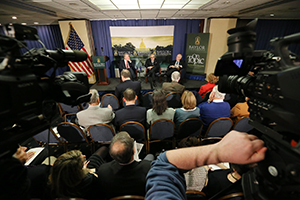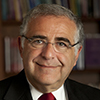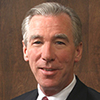By Robert Dilday
The more than 1,200 faith-based universities in America increasingly are confronted with regulatory challenges which some believe restrict their deeply held religious mission.
But a larger challenge may be persuading society to invest in higher education that is less about producing students to compete in a global economy and more about instilling the “value of values.”
That was the conclusion of three university presidents from diverse religious traditions who discussed the “calling” of faith-based higher education Feb. 4 at the National Press Club in Washington.
The event was sponsored by Baylor University, the nation’s largest Baptist-affiliated school, on the eve of the National Day of Prayer breakfast. Joining Ken Starr, president of the school in Waco, Texas, were John Garvey, president of the Catholic University of America in Washington, and Richard Joel, president of Yeshiva University in New York.
 “We would all agree that education is more than a transmission of information, attending classes, doing lab work — but what is it?” asked Starr.
“We would all agree that education is more than a transmission of information, attending classes, doing lab work — but what is it?” asked Starr.
The three acknowledged difficulties in responding to recent regulations such as the U.S. Department of Health and Human Services’ contraception mandate and government involvement in setting faculty employment guidelines.
They also found troubling a proposed Department of Education “rating system” for universities and colleges. The proposal is “triggering opposition from all institutions that this is a reductionist approach” which “won’t take into account the mission that universities are trying to accomplish,” said Starr.
Tracking those government initiatives comes naturally to the three presidents, each of whom has a law degree. Both Garvey and Starr are former law school deans.
 But Joel, whose institution is the oldest under Jewish auspices in America, saw a larger issue.
But Joel, whose institution is the oldest under Jewish auspices in America, saw a larger issue.
“To me the major challenge is for parents and students to know that [faith-based higher education] is worthy of investing in,” he said. “The challenge is the degree that society has accepted the notion that education is credentialing for careers, and people look for where they can get the best deal to get the requisite credential.”
Given the cost of tuition at private universities, persuading students that “the choice of investing in them is a valuable proposition and worthwhile” can be difficult, he added.
Joel recalled a former U.S. president telling him that higher education’s primary aim is to prepare students to compete in a global economy.
 “But our motto [at Yeshiva] is that education is meant to ennoble and enable. We need to teach students what are the values they bring to the competition and once they succeed in the competition, what are their responsibilities?”
“But our motto [at Yeshiva] is that education is meant to ennoble and enable. We need to teach students what are the values they bring to the competition and once they succeed in the competition, what are their responsibilities?”
“The point of education is to help our students advance in both wisdom and virtue,” agreed Garvey, whose school is the only one in the United States overseen by the U.S. Conference of Catholic Bishops. “And they are connected to each other in surprising ways. Virtue makes us aim at the right mark; wisdom helps us choose the proper means. When we learn about topics we can’t make proper judgments about them without an ethical basis.”
Joel said he worries where students will find the “ethical ammunition” to develop into responsible American citizens.
 “This generation of young students is a gift to us because they want to matter. … The fuel is that you matter because you are a human given the gift of responsibility, and here is a largely selfish life experience called ‘college’ when you can invest in thoughts, explore thoughts, but in an environment which focuses your purpose — not just to have ideas but to know what to do with them.”
“This generation of young students is a gift to us because they want to matter. … The fuel is that you matter because you are a human given the gift of responsibility, and here is a largely selfish life experience called ‘college’ when you can invest in thoughts, explore thoughts, but in an environment which focuses your purpose — not just to have ideas but to know what to do with them.”
Maintaining a robust mix of faith-based and secular higher education is essential to the country’s well-being, the three presidents said.
“One of the glories of the American system of higher education is that we have this kind of plurality,” said Garvey. “It’s good for consumers of higher education to have different institutions. You don’t see this in countries with an established church. … In America, because of the First Amendment it has forced institutions like ours to grow up and survive under our own steam. It would be unfortunate if in the name of diversity the government were to insist that we all be like one another.”
Despite political dysfunction, the United States has never come close to adopting an authoritarian regime and has remained a “remarkably free society,” concluded Starr.
“It is now our challenge to maintain that in the 21st century.”
